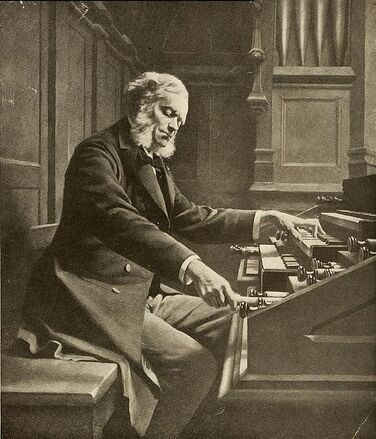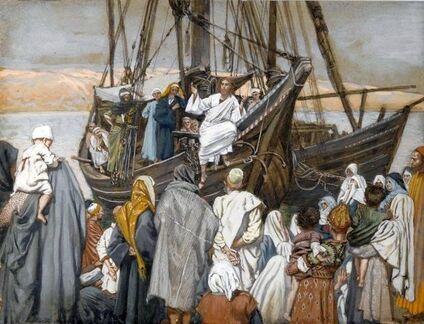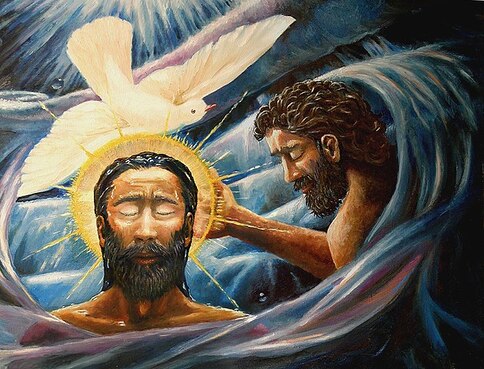 By Painting: Jeanne Rongier (1852-1934)[1]; Photo: Braun & Co - This photo was published in: Indy, Vincent d'; Newmarch, Rosa (translator) (1910) [1907] César Franck: a Translation from the French of Vincent d'Indy, London & New York: John Lane, pp. Frontispiece Retrieved on 30 June 2009., Public Domain, https://commons.wikimedia.org/w/index.php?curid=394256 By Painting: Jeanne Rongier (1852-1934)[1]; Photo: Braun & Co - This photo was published in: Indy, Vincent d'; Newmarch, Rosa (translator) (1910) [1907] César Franck: a Translation from the French of Vincent d'Indy, London & New York: John Lane, pp. Frontispiece Retrieved on 30 June 2009., Public Domain, https://commons.wikimedia.org/w/index.php?curid=394256 The Basilica of Saint Clotilde, Paris houses the famous 1859 Aristide Cavaillé-Coll organ played by an impressive succession of organists serving the basilica. This Sunday morning we hear compositions by three of these gentlemen: Jean Langlais, Théodore Dubois, and St. Clotilde's first Organiste titulaire, César Franck. Franck served St. Clotilde from 1859 until his death in 1890. The exquisite tonal palette of the organ, considered the crowning achievement of the Cavaillé-Coll family at the time, provided endless inspiration to Franck's substantial contributions to the organ repertoire. His set of Six Pièces, composed between 1860-62, is to this day a staple of the organ oeuvre. "Cantabile," so named for the singing quality of the oboe stop melody, begins the services. Théodore Dubois served the basilica as assistant organist (1858) and choirmaster (1863) until his appointment to the Madeleine Church in 1869, succeeding Camille Saint-Saëns. It is from this later period that we hear two settings of "Communion" from his liturgical collection Dix pièces pour orgue ou harmonium. In the 20th century, Jean Langlais held the post of Organiste titulaire at St. Clotilde from 1945-1988. A prolific composer with 254 published works, his style exhibited Gregorian chant-like themes, modal harmonies, and adventurous dissonances. "Pasticcio," from Langlais' Organ Book (1957), closes the services. In music terminology, a pasticcio is a work that intentionally borrows from other composers or eras, in this case, the Medieval era. The Chancel Choir sings an exuberant and highly imaginative setting of Psalm 27 in "The Lord Is My Light and My Salvation" by Rosephanye Powell at the 11:00 a.m. "choral" service. Pianist Danielle Snyder joins us in this wonderful rendition of the psalmist's joyful proclamation of God's enduring love and wisdom. At the 6:00 p.m. "eclectic" service, cantor Blair Carpenter and I offer a "swampier" take on the Rosephanye Powell anthem along with music by Kacey Musgraves and David Haas.
0 Comments
 By James Tissot - Online Collection of Brooklyn Museum; Photo: Brooklyn Museum, 2007, 00.159.85_PS2.jpg, Public Domain, https://commons.wikimedia.org/w/index.php?curid=10195913 By James Tissot - Online Collection of Brooklyn Museum; Photo: Brooklyn Museum, 2007, 00.159.85_PS2.jpg, Public Domain, https://commons.wikimedia.org/w/index.php?curid=10195913 We are called to follow Jesus: to drop our old ways and be lead by the truth as we will hear in this week's gospel reading from Matthew. We are called to be, like our Christian forebears, our own unique brand of saint. Saint's' Days (1999) is a collection of twelve miniatures highlighting a saint feast day, one per month, by Daniel Pinkham. Excerpts from the work will be shared throughout the morning services showcasing Pinkham's distinctive discordant harmonic language but one that displays great beauty. The titles of each miniature set up a scene centered around the saint in question; the music offering imaginative plays on the subject material. At the Prelude, three excerpts: I. Saint Paul, who, on his way to Damascus, experienced a vision of Christ, and was converted. 23 Jan. II. Saint Brigid of Ireland, who fed the poor with butter and turned her bath-water into beer. 1 Feb. XI. Saint Caecilia, who, while the organ was playing, prayed that the Lord keep her heart pure that she not be confused. 22 Nov. At the Postlude, a tumultuous musical depiction of Saint Stephen (26 December) following Christ to the ultimate end by sacrificing his life for the gospel. The glorious vision beheld at his passing is epitomized in just the final two measures of this twelfth and final movement of Saints' Days: a culmination of an agitated and dissonant journey from darkness to the light provided by resolution. The Plymouth Ringers remind us of the season as they offer an arrangement of the Epiphany hymn "Brightest and Best" by Terry Osman. The Chancel Choir offers "God Has Called Us" (Robert Hobby) prior to the Annual Meeting at the 11:00 a.m. service. Conceived of in an Anglican stately musical style, the text by noted hymn writer Susan Palo Cherwien asks us to heed the call of God and "answer with our lives." Amy Welsh conducts. At 6:00 p.m., songs by Gungor, U2, and more convey the call of Jesus to follow him and be fishers of people. Cantor Blair Carpenter and bassist Peter Strening join me as we explore spiritual songs found in unlikely places.  By Sister Monica - Own work, CC BY-SA 4.0, https://commons.wikimedia.org/w/index.php?curid=51883216 By Sister Monica - Own work, CC BY-SA 4.0, https://commons.wikimedia.org/w/index.php?curid=51883216 With an eye to the Martin Luther King Jr. holiday weekend, works by African-American composers and settings of spirituals will be celebrated. The music also celebrates the opportunities brought forth by social justice reforms allowing these composers and the culture they love to enter the public arena. David Hurd is one of the most visible African-American organists working today. Currently serving as Director of Music at the Church of Saint Mary the Virgin in Times Square, New York City, he has over 100 published choral and organ works and has contributed to numerous hymnals, including The Hymnal 1982 and The New Century Hymnal. The first movement from his Suite in Three Movements (2010) entitled "Organ Point" will be played at the Postlude. The title refers to the repetitive pedal point figure heard throughout the work, the manuals evoking an English trumpet fanfare overhead. Two creative settings of traditional spirituals will also be heard from the organ. Robert Thompson's flowing accompaniment figures and gospel overtones create an effective rendition of "Deep River" at the Prelude. A jazz-infused arrangement of "Let Us Break Bread Together" by Charles Callahan will carry us through the 9:00 a.m. communion time. Steven Milloy was a colleague of mine at Cincinnati College-Conservatory of Music matriculating for his Master of Music Degree in Choral Conducting. He currently leads the Cincinnati Men's Chorus and is also Music Director for St. John's United Church of Christ following an accomplished career as an arranger, activist for African-American and LGBTQ causes, and singer, including being a member of the eclectic vocal octet Pieces of Eight. The Chancel Choir offers his simple yet satisfying version of the classic spiritual "This Little Light of Mine" at the 11:00 a.m. choral service. At 6:00 p.m., soprano Blair Carpenter and I continue exploring the African-American spiritual with selections from the morning and a few new ones.  By I, Davezelenka, CC BY-SA 3.0, https://commons.wikimedia.org/w/index.php?curid=2420206 By I, Davezelenka, CC BY-SA 3.0, https://commons.wikimedia.org/w/index.php?curid=2420206 The hymnody, choral anthem texts, and readings from scripture in the Epiphany season make plentiful references to light as we reflect upon Christ's illumination of our hearts. On this Second Sunday of Epiphany, the baptism of Christ in the Jordan invites us to reflect also on our own renewal and showing the face of Christ to all we meet. From the organ...the baptismal hymn "O Blessed Spring" is arranged by James Biery as a set of two contrasting movements. The first, a somewhat fugal play on the opening melody line overlaying the complete tune in the pedal (reminiscent of Baroque-era composition practices). The second, a flowing string accompaniment in the Lydian mode with the hymn tune freely reinterpreted on a flute stop high above: a mystical and wistful retelling of the tune. Healey Willan's gentle setting of "Song 13" (composed by Orlando Gibbons in 1623) evokes a text often paired with this melody, "Light Divine": "Holy Ghost, with light divine...turn the darkness into day." "Each Morning God Renews Her Grace" is the first movement from Gerhard Krapf's "Organ Sonata III on Morning Chorales." Unified by a recurring quartal/quintal harmony fanfare, the work eventually reveals the hymn tune in full within a contemporary chorale treatment before a final recapitulation of the fanfare. The Chancel Choir offers "Arise and Shine!" by John Paradowski. Based on Isaiah 9:2,6, this joyful work speaks to the Light and Baptism of Christ with the Antiphon sung by choir and congregation: Arise and shine! Your light has come to all who dwell in darkness. Arise and shine, for in our midst the light of Christ is with us. At the 6:00 p.m. service, we honor the musical legacy of Graham Maule, who passed away on December 29, 2019. A hymn writer and musician known for his frequent collaborations with John Bell and contributions to the Iona Community songbook, his works have been used often throughout Plymouth's services, especially on Sunday evenings. Matt Riley's rendition of the Irish tune "St. Columba," named after the founder of the Iona Abbey, will close the service.
 By Leopold Kupelwieser (1796-1862) - Diocese de Rouen, Public Domain, https://commons.wikimedia.org/w/index.php?curid=33909092 By Leopold Kupelwieser (1796-1862) - Diocese de Rouen, Public Domain, https://commons.wikimedia.org/w/index.php?curid=33909092 On this Second Sunday of Christmas, we also observe the Epiphany, which will be a mere twelve hours away on January 6. Music and words depicting the Magi, their guiding star: the Light — the Story of Christmas — will usher in these first services of the new year. The Epiphany hymn "How Lovely Shines the Morning Star" receives a Neo-Baroque treatment by early twentieth century composer Hugo Distler. Recalling the imitative and quai-fugal stylings of composers such as Johann Pachelbel and Dietrich Buxtehude, this short plaintive setting ends with a restatement of the original chorale reimagined by Distler. A "Noël" by George Frederick McKay echoes the sounds of Christmas with its inference of a yuletide church bell peal. Soprano Blair Carpenter and flutist Aaron McGrew will join me on Swiss composer Frank Martin's "Trois Chants de Noel" (Three Christmas Songs). Composed in 1947, the work encompasses three brief songs poetically describing the visitation of Jesus in the manger by the Magi ("The Gifts"), the collective original manger scene ("A Picture of Christmas"), and the arrival of the shepherds ("The Shepherds"). Musically, Martin works often from a medieval perspective though employing Middle Eastern tonalities in the opening Magi section. Along with the incessant flute obligato lines throughout, these songs take on an artful otherworldly quality. |
Details
|

 RSS Feed
RSS Feed